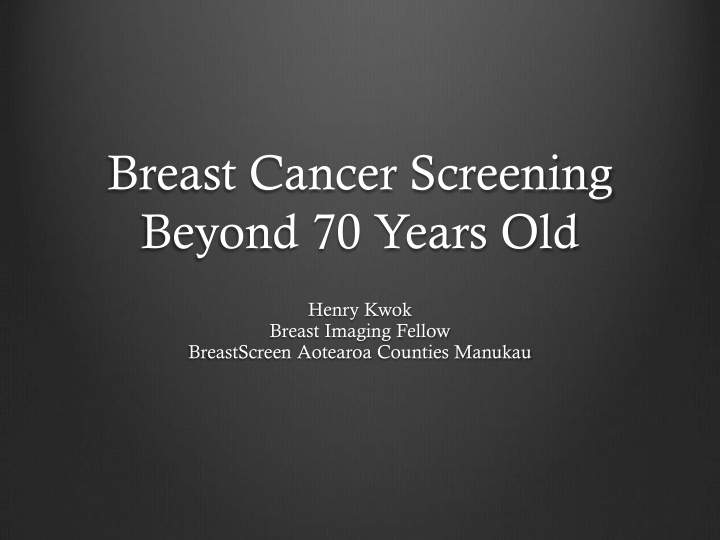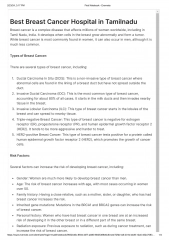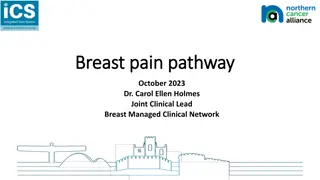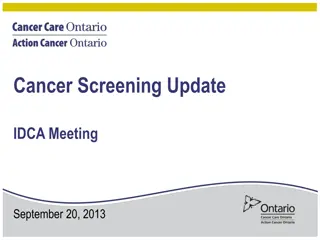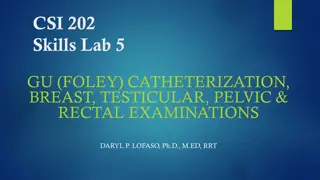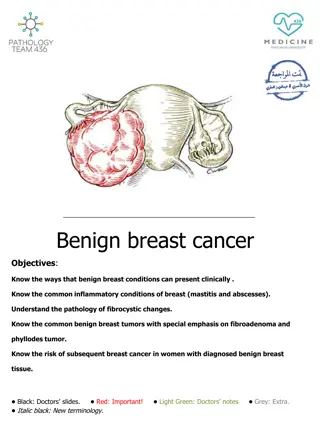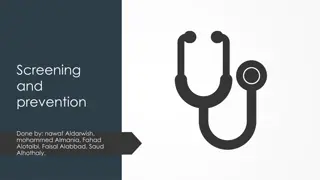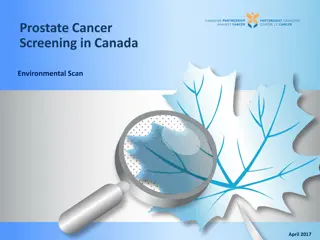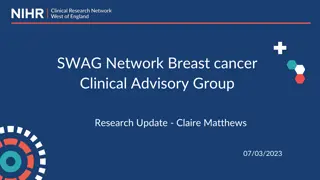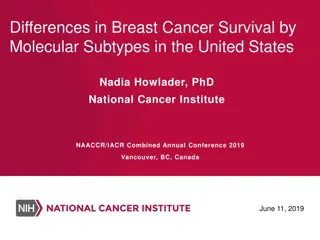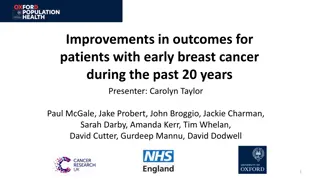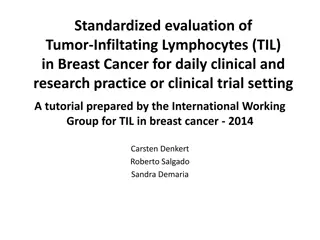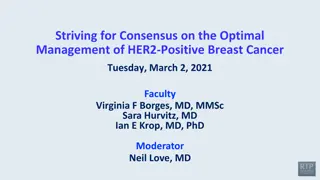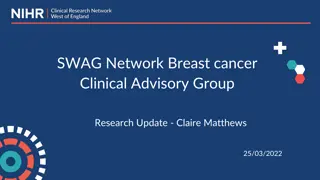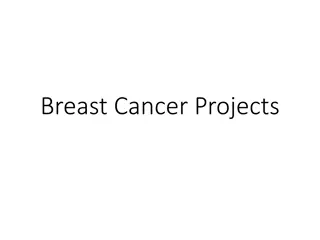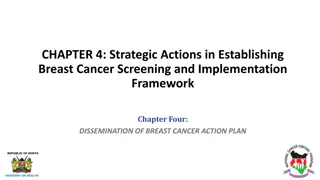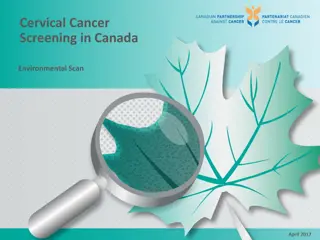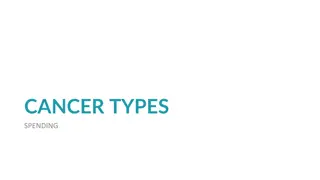Breast Cancer Screening Beyond 70 Years Old Study
This study explores the relevance and effectiveness of breast cancer screening for women aged 70 and above, utilizing data from the Auckland Breast Cancer Registry. It examines demographics, cancer presentation modes, characteristics, and long-term outcomes to address the question of whether screening beyond 70 is beneficial.
Download Presentation

Please find below an Image/Link to download the presentation.
The content on the website is provided AS IS for your information and personal use only. It may not be sold, licensed, or shared on other websites without obtaining consent from the author.If you encounter any issues during the download, it is possible that the publisher has removed the file from their server.
You are allowed to download the files provided on this website for personal or commercial use, subject to the condition that they are used lawfully. All files are the property of their respective owners.
The content on the website is provided AS IS for your information and personal use only. It may not be sold, licensed, or shared on other websites without obtaining consent from the author.
E N D
Presentation Transcript
Breast Cancer Screening Beyond 70 Years Old Henry Kwok Breast Imaging Fellow BreastScreen Aotearoa Counties Manukau
Screening Beyond 70 Years Old Pertinent Questions: Why bother? Is it effective? Is it worthwhile?
Why Bother? 1 in 5 breast cancer patients are >= 70 years of age Auckland Breast Cancer Registry Data Currently BreastScreen Aotearoa is offering nationwide, publicly- funded breast cancer screening for all women aged 45-69. Some women >= 70 continue with screening if they meet certain risk criteria or through self-funding The evidence for breast cancer screening beyond age 70 is lacking
Defining the Problem What do we know about breast cancers in patients aged 70 or over?
Auckland Breast Cancer Registry Auckland Breast Cancer Registry captures all breast cancer cases in the Greater Auckland region since 2000 The Registry records de-identified data of patient demographics, cancer characteristics, treatment and long term follow up outcome
Study Objective #1 Using the Auckland Breast Cancer Registry Data, this study retrospectively examines: Demographics Mode of breast cancer presentation i.e. screen detected vs symptomatic Cancer characteristics at presentation Cancer stage at presentation Long term outcome Survival, recurrence, metastasis, second cancer Ethics approval
Registry Data Set The study covers the period 2000-2014 A total of 11481 patients have been identified Of whom, 2002 (17%) of the patients were 70 or over
Patient Demographics Overall 11481 100% 58 99.4% Under 70 9479 83% 53 99.6% 70 or over 2002 17% 79 98.5% N % total Age % female Ethnicity - European - Pacific - Maori - Asian 66% 8% 7% 7% 64% 8% 8% 8% 78% 5% 3% 3%
Breast Cancer Presentation Under 70 Symptomatic Screen-detected 70 or over Symptomatic Screen-detected 16% 49% 51% 84%
Breast Cancer Histology Overall 68.1% 15.2% 9.7% 1.6% 1.7% 0.4% 0.3% Under 70 68.1% 16.8% 8.9% 1.7% 1.3% 0.3% 0.3% 70 and over 67.9% 7.6% 13.8% 1.3% 3.8% 1.0% 0.2% IDC NOS DCIS Lobular Tubular Mucinous Papillary Medullary
T-Stage at Diagnosis Under 70 70 and over 47% 38% 34% 27% 17% 8% 6% 6% 3% 2% Tis T1 T2 T3 T4
Nodal and Metastasis Status at Diagnosis Overall Under 70 70 or over N stage - N0 - N1+N2+N3 - Nx M stage - M0 - M1 - Mx 53% 31% 17% 55% 31% 14% 44% 29% 27% 13% 4% 84% 14% 3% 83% 7% 6% 87%
Nottingham Prognostic Index 70 or over Excellent Good Moderate Poor Under 70 0% 20% 40% 60% 80% 100%
Follow up - Outcome to-date Under 70 5.3% 3.0% 13.0% 12.8% 70 or over 4.2% 2.1% 15.3% 41.9% Recurrence Second cancer Metastasis Death (all cause) - Died of breast cancer 9.1% 14.8% - Died with breast cancer 1.4% 3.2% - Died of other causes 2.3% 23.8%
Predictors for Cancer Death: Regression Analysis Predictor Odds ratio P-value Age >= 70 1.9 P<0.05 Symptomatic Positive node 4.1 1.7 P<0.05 P=0.07 Positive metastasis 65 P<0.05 ER positive 0.55 P<0.05 PR positive 0.19 P<0.05 NPI P<0.05
Predictors for Recurrence: Regression Analysis Predictor Odds Ratio P-value Age >= 70 0.31 P<0.05 Symptomatic Positive node 3.6 0.63 P<0.05 NS Positive metastasis 4.7 P<0.05 ER positive PR positive 0.28 0.75 P<0.05 NS NPI P<0.05
Defining the Problem In the >=70 age group, which make up 17% of the patient population, there are: More symptomatic presentation More invasive disease at more advanced stage; less in situ disease More cancer death, even adjusting for other prognosticators
Finding a Solution Can screening reduce excess cancer-mortality in patients >= 70 years of age? Little direct evidence
Study Design: Objective #2 Patients divided into four subgroups based on age group and mode of presentation <70 years < 70 years Symptomatic Screen-detected The cancer characteristics and subsequent outcome for the 4 subgroups are compared >=70 years >= 70 years Symptomatic Screen-detected Effect of screening is inferred
T-Stage at Diagnosis >=70, screened Tis T1 T2 T3 T4 <70, screened >=70, symptomatic <70, symptomatic 0% 20% 40% 60% 80% 100%
Node Involvement at Diagnosis 50% 45% 40% 35% 30% 25% 20% 15% 10% 5% 0% <70, screened >=70, screened <70, >=70, symptomatic symptomatic
Metastasis at Diagnosis 7.0% 6.0% 5.0% 4.0% 3.0% 2.0% 1.0% 0.0% <70, screened >=70, screened <70, symptomatic >=70, symptomatic
Cancer Death 18% 16% 14% 12% 10% 8% 6% 4% 2% 0% <70, screened >=70, screened <70, symptomatic >=70, symptomatic
Effects on Cancer Death % cancer death with screening % cancer death if symptom- atic 16% 17% Absolute difference Relative Risk Reduction P-value* Under 70 70 or over 3% 7% 13% 10% 83% 59% P<0.05 P<0.05 *After adjusting for nodal status, presence of metastasis and receptor status using regression analysis
Finding a Solution Regardless of age, patients with screen-detected cancers have: Earlier stage Less cancer death The effects are more pronounced in the younger age group, but they are still observable in the older age group
Caveats Symptomatic presentation is being used as a surrogate for not having screening But some symptomatic patients might have been having screening The study did not capture those with asymptomatic cancer who did not have screening Unclear how and at what frequency screening was performed, esp in the > 70 years age group Selection bias patients self selected or have certain risk factors
But is it Worthwhile? The 70+ age group have a non-cancer death rate of 23.8% vs 2.3% in the < 70 age group during the follow up period Reduction in cancer death may be small in comparison to background non-cancer- related mortality
Moving Goal Post Source: Office for National Statistics, UK
Is it Worthwhile? As life expectancy increases and non-cancer death decreases, any potential reduction in cancer-deaths becomes proportionately more significant The benefit of screening would be most pronounced in those who are healthy and have correspondingly longer life expectancy Dying of breast cancer vs dying with breast cancer
Summary Patients aged 70 or over present with more advanced disease and worse survival than patients under 70 years of age While age is an independent predictor of survival in its own right, not having screening is likely to have contributed to the more advanced disease state and poorer survival in the >=70 age group Patients >= 70 who have screen-detected cancer have better survival when compared to those who have symptomatic, non- screen-detected cancer (with caveats) The degree of benefit from screening in the >= 70 age group will be largely dependent on the patients underlying health status
